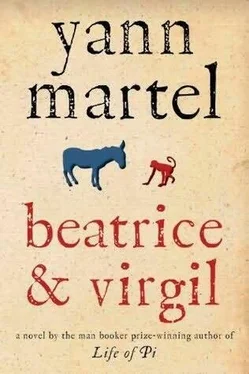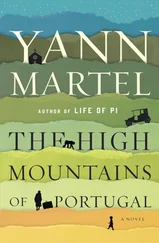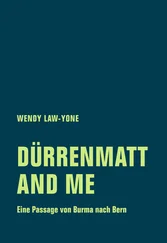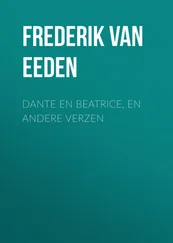Yann Martel - Beatrice and Virgil
Здесь есть возможность читать онлайн «Yann Martel - Beatrice and Virgil» весь текст электронной книги совершенно бесплатно (целиком полную версию без сокращений). В некоторых случаях можно слушать аудио, скачать через торрент в формате fb2 и присутствует краткое содержание. Жанр: Современная проза, на английском языке. Описание произведения, (предисловие) а так же отзывы посетителей доступны на портале библиотеки ЛибКат.
- Название:Beatrice and Virgil
- Автор:
- Жанр:
- Год:неизвестен
- ISBN:нет данных
- Рейтинг книги:5 / 5. Голосов: 1
-
Избранное:Добавить в избранное
- Отзывы:
-
Ваша оценка:
- 100
- 1
- 2
- 3
- 4
- 5
Beatrice and Virgil: краткое содержание, описание и аннотация
Предлагаем к чтению аннотацию, описание, краткое содержание или предисловие (зависит от того, что написал сам автор книги «Beatrice and Virgil»). Если вы не нашли необходимую информацию о книге — напишите в комментариях, мы постараемся отыскать её.
A famous author receives a mysterious letter from a man who is a struggling writer but also turns out to be a taxidermist, an eccentric and fascinating character who does not kill animals but preserves them as they lived, with skill and dedication – among them a howler monkey named Virgil and a donkey named Beatrice…
Beatrice and Virgil — читать онлайн бесплатно полную книгу (весь текст) целиком
Ниже представлен текст книги, разбитый по страницам. Система сохранения места последней прочитанной страницы, позволяет с удобством читать онлайн бесплатно книгу «Beatrice and Virgil», без необходимости каждый раз заново искать на чём Вы остановились. Поставьте закладку, и сможете в любой момент перейти на страницу, на которой закончили чтение.
Интервал:
Закладка:
Still, art is rooted in joy, as his music teacher had pointed out. It was hard after rehearsing a play, or practicing a piece of music, or visiting a museum, or finishing a good book, for Henry not to ache for the access he once had to creative joy.
To keep himself busy, Henry involved himself in a last venture, one that took up more of his daylight hours and in a conventionally more serious way than any other, and this was his work in a cafe. Actually, it was a chocolateria , which is what caught his attention in the first place. Coffee was also served, and it was good coffee too, but The Chocolate Road was primarily a fair-trade cocoa cooperative that produced and retailed chocolate in all its forms, from white to milk to dark, in various degrees of purity and in a wide range of flavours, in bars, boxes and hot-chocolate powders, in addition to cocoa powder and chips for baking. Their name-brand produce came from farm cooperatives in the Dominican Republic, Peru, Paraguay, Costa Rica, and Panama and was sold in an increasing number of health food stores and supermarkets. They were a small but growing business, and their chocolateria , which was half chocolate mini-market, half hot-chocolate establishment, was their headquarters. The place had a nice feel to it, with an embossed tin ceiling, rotating art exhibits, good, usually Latin music and a southerly exposure so it was often lit up by sunlight. As it wasn't far from where Henry and Sarah lived, Henry often went there to read his paper and sip on rich hot chocolate.
One day he saw a sign posted in a window: HELP WANTED. On impulse, he inquired. Henry didn't need a job, in fact he couldn't work legally, but he liked the people at The Chocolate Road and he admired their principles. He applied, they were intrigued, they agreed that he would be paid in shares, and, lo, Henry became a small shareholder in a chocolate concern and a part-time waiter and general helper. Sarah was amused and puzzled; she chalked it up to Henry doing research. Quickly his self-consciousness at serving strangers vanished. In fact, he enjoyed being a waiter. It was a moderate form of exercise and it allowed him to observe briefly but constantly the behaviour and dynamics of people, whether solitary drinkers, couples, families, or groups of friends. His hours at The Chocolate Road went by pleasantly.
To complete the picture, Sarah and he adopted a small puppy and a kitten from an animal shelter, neither of them remotely purebred, just bright-eyed and vigorous. The first they named Erasmus, the second Mendelssohn. Henry was curious to see how they would get along. Erasmus proved rambunctious, but easy to train. He often came with Henry on errands. Mendelssohn, a lovely black feline, was a more retiring creature. If strangers visited, she disappeared under the sofa.
That was the life Henry and Sarah constructed for themselves in that great city. They thought they would live there for a year or so, an extended holiday, but they weren't inclined to leave after the first year, nor after the second, and then they stopped thinking about when exactly they would leave.
During their time in the city, Henry's earlier existence as a writer was not entirely forgotten. Reminders gently knocked on the door of his consciousness in the form of letters. By the most roundabout routes, often months after their writers had posted them, he continued to receive letters from readers. A reader in Poland, for example, would write to him care of his publisher in Cracow. After a time, his Polish publisher would forward it to his Canadian literary agent, who would send it on to him. Or a Korean reader would write to him at the address of his British publisher, who would re-expedite the letter, and so on.
Letters came from Great Britain, Canada, the United States, and all other corners of the former British empire, but also from across Europe and Asia, their writers of all ages and stations, the English varying from the confidently refined to the sublimely butchered. Some of those who wrote to him must have felt they were writing a message in a bottle and tossing it into the ocean. But their efforts were not in vain. The solicitous winds and currents of the publishing world steadily brought the letters to Henry.
Some would more accurately be described as packages. They might contain an introductory letter from a high school teacher and a series of earnest essays written by her students about his novel. Or they might contain a photograph or an article that the sender thought might interest Henry. But more typically they were proper letters, typed or handwritten. The typed ones, composed on a computer, were generally more elaborate and discursive, small essays sometimes, while the handwritten ones tended to be shorter and more personal. Henry preferred the latter. He liked the personal art of each writer's handwriting, some nearly robotic in appearance and ultra-legible, others jagged scrawls that nearly defied comprehension. It always astonished him how twenty-six highly conventionalized glyphs could find such varied expression once a living hand set to write them down. Was it Gertrude Stein who said that language was alphabet in disorder? Page layout was another source of interest in handwritten letters, sometimes of concern, as in the cases where the lines of prose were spread over the page like vegetation on ground of uneven quality, spaced out here but bunched up there, often towards the bottom of a page, where the writer was running out of room but still needed to say the essential, hence the sentences that crawled up the side, like the roots of a plant in a too-small pot. Doodles and small drawings were regularly included, art traded for art, his for theirs. Many letters contained questions. A reader had a question, or two, or three.
Henry answered each and every letter. He had a printer make a folded, invitation-size card for him. The front displayed colourful elements from the jacket artwork of various international editions of his book. This card presented two advantages. It was a personal token that the reader might appreciate, and it limited how much Henry could write to a maximum of three small pages: the two inside faces of the card and its back. That allowed for replies long enough to please his readers and short enough to please him.
Why did he reply to so many letters? Because though his novel belonged to his past, it was fresh to every reader who read it and that freshness came through in their letters. To remain silent in the face of kindness and enthusiasm would have been rude. Worse: it would have been thankless. It was gratitude, then, that got Henry into the habit every week of taking the time here and there to sit down and write back to readers. He found he could produce five or so replies without strain wherever he happened to be, in a cafe or during a lull at The Chocolate Road or at rehearsals.
Henry ignored personal queries, except if the writer was quite young, but he willingly discussed his novel. The questions or comments were often the same. Soon he could reel off standard responses, with easy variations to fit the tone or angle of a particular letter. Henry's novel featured wild animals, and many letters came down to questions about them, about real animals and figurative animals. Readers assumed he had training in zoology, or at the very least a lifelong passion for the natural world. He replied that he had the same broad affection for nature that any sensitive inhabitant of this planet has, but no outstanding interest in animals, no abiding love for them that might be called a character trait. The use of animals in his novel, he explained, was for reasons of craft rather than of sentiment. Speaking before his tribe, naked, he was only human and therefore possibly-likely-surely-a liar. But dressed in furs and feathers, he became a shaman and spoke a greater truth. We are cynical about our own species, but less so about animals, especially wild ones. We might not shelter them from habitat destruction, but we do tend to shelter them from excessive irony.
Читать дальшеИнтервал:
Закладка:
Похожие книги на «Beatrice and Virgil»
Представляем Вашему вниманию похожие книги на «Beatrice and Virgil» списком для выбора. Мы отобрали схожую по названию и смыслу литературу в надежде предоставить читателям больше вариантов отыскать новые, интересные, ещё непрочитанные произведения.
Обсуждение, отзывы о книге «Beatrice and Virgil» и просто собственные мнения читателей. Оставьте ваши комментарии, напишите, что Вы думаете о произведении, его смысле или главных героях. Укажите что конкретно понравилось, а что нет, и почему Вы так считаете.












